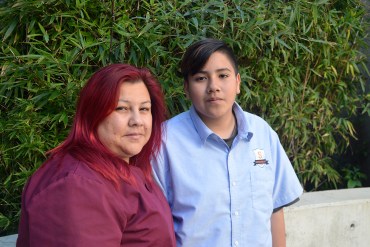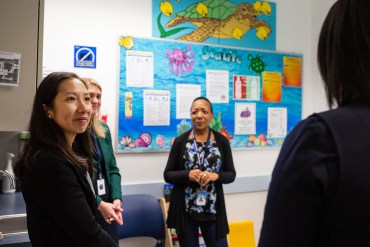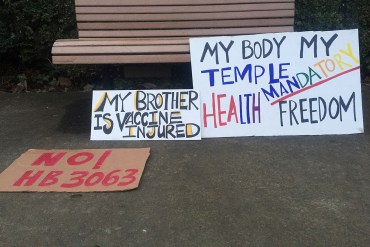Listen: Syphilis Spreads Into Rural America
Lauren Weber, one of Kaiser Health News’ new Midwest correspondents, joined St. Louis Public Radio reporter Jeremy Goodwin on “St. Louis on the Air” Friday to discuss how syphilis is making inroads into rural counties across the Midwest and West.
Enfermedad del hígado graso afecta a niños latinos como un “tsunami silencioso”
Investigaciones recientes muestran que cerca de 1 de cada 4 personas en el país sufre la enfermedad del hígado graso. Pero entre los latinos, la tasa es significativamente más alta.
Must-Reads Of The Week From Brianna Labuskes
Newsletter editor Brianna Labuskes wades through hundreds of health articles from the week so you don’t have to.
Liver Illness Strikes Latino Children Like A ‘Silent Tsunami’
Potentially deadly fatty liver disease, linked to overconsumption of sugar in drinks and food, often starts in childhood. The goal: Get children to change their habits.
La sífilis avanza en zonas rurales, y una frágil red de salud no puede detenerla
Mujeres embarazadas, hombres jóvenes y adolescentes forman parte del número cada vez mayor de pacientes con sífilis que llegan a las clínicas en las zonas rurales del país.
As Syphilis Invades Rural America, A Fraying Health Safety Net Is Failing To Stop It
Syphilis is spreading from big cities into rural counties across the Midwest and West. One Missouri clinic has seen more than six times as many cases in the first few months of 2019 compared with the same period last year. Communities grappling with budget cuts and crumbling public health infrastructure also lack experience in fighting the disease.
La “estrategia de riesgo” de Planned Parenthood para actualizar su imagen
En una gira nacional, la nueva directora de la organización busca enfocar el ojo público en servicios que la entidad ofrece y que no están relacionados con el aborto.
Planned Parenthood’s ‘Risky Strategy’ To Update Its Image
The nation’s largest reproductive health services provider is in the midst of a high-stakes effort to showcase what it considers its vital role in providing community health care.
Workplace Wellness Programs Barely Move The Needle, Study Finds
New research published in JAMA detected some changes in healthy behavior like weight and stress, but little overall impact in workers’ health status or employer health care spending.
Watchdogs Cite Lax Medical And Mental Health Treatment Of ICE Detainees
The Adelanto ICE Processing Center houses nearly 2,000 people in California. Federal, state and watchdog reviews say the Florida-based firm that runs the facility fails to provide adequate health care.
Heavy Rains, End Of Drought Could Help Keep West Nile Virus Subdued — For Now
Scientists say drought can spur transmission of the disease and that wetter winters since 2015 have helped reduce the number of infections in California. In the long term, however, climate change could mean more drought — and more infections.
Big Soda Pours Big Bucks Into California’s Capitol
The soda industry spent $11.8 million to influence policy statewide in 2017 and 2018. As politicians once again consider bills that would tax and label sugary drinks, more big money is expected to flow.
Consumers Rejected Drug Plan That Mirrors Trump Administration Proposal
What to know about PBMs and rebates ahead of the Senate drug price hearing on — you guessed it — PBMs.
Mourning Paradise: Collective Trauma In A Town Destroyed
The depth of psychological damage after the fire in Paradise, Calif., may depend on how much help residents are getting now.
Must-Reads Of The Week From Brianna Labuskes
Newsletter editor Brianna Labuskes wades through hundreds of health articles from the week so you don’t have to.
Más exenciones a medida que padres y doctores burlan las leyes de vacunación
El número de niños de California que recibieron exenciones médicas de las vacunas se ha triplicado en los últimos dos años. Y muchos médicos autorizan estas exenciones.
Exemptions Surge As Parents And Doctors Do ‘Hail Mary’ Around Vaccine Laws
In California, medical exemptions to skip childhood vaccinations are on the rise. The trend underlines how hard it is to get parents to comply with vaccination laws meant to protect public safety when a small but adamant population of families and physicians seems determined to resist.
Crece la preocupación por posible vínculo entre popular herbicida y el cáncer
El glifosato es el herbicida más utilizado en los Estados Unidos, y probablemente en todo el mundo. Se usa en casi cada acre de maíz, algodón y soya cultivados en el país. La marca más popular es Roundup.
How Easy Are Vaccine Exemptions? Take A Look At The Oregon Model
About 95% of parents in Oregon who skip vaccines opt to use the state’s online education tool to print their own exemption certificates.
Popular Weed Killer’s Alleged Link To Cancer Spreads Concern
The main ingredient in numerous popular herbicides has been implicated by two juries in the cancers of frequent users, but major public health agencies disagree over whether it is a carcinogen. Can you use it safely in your garden? Here are some answers to questions you may have about the weed killer glyphosate.






















